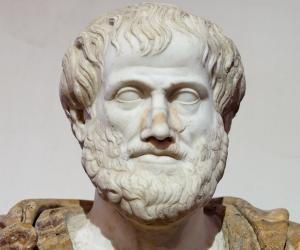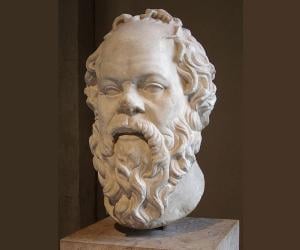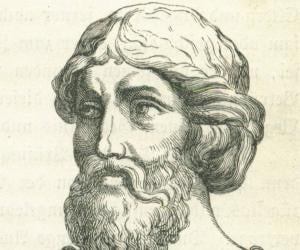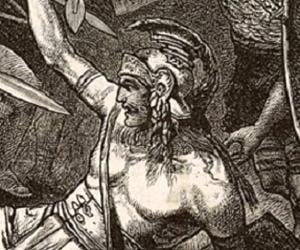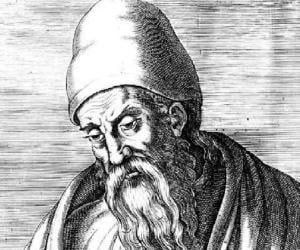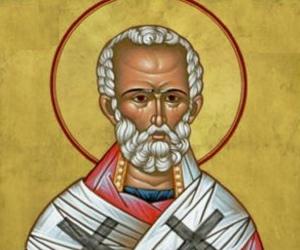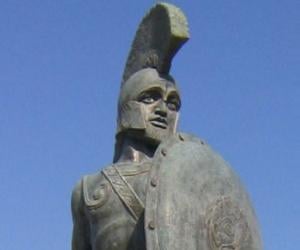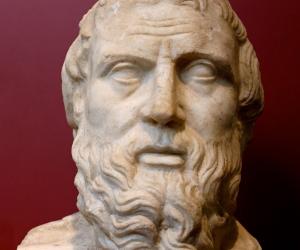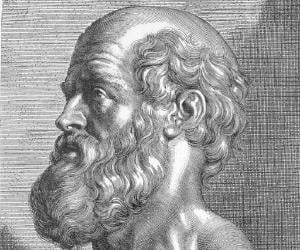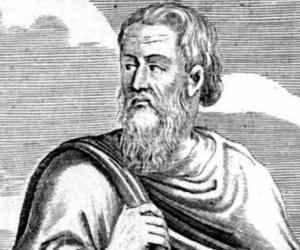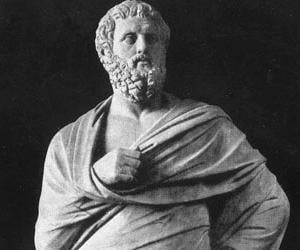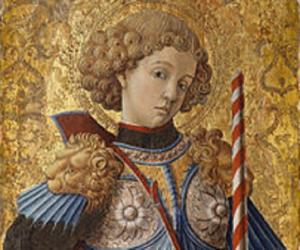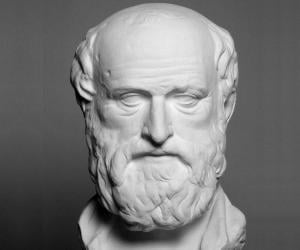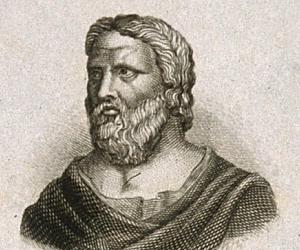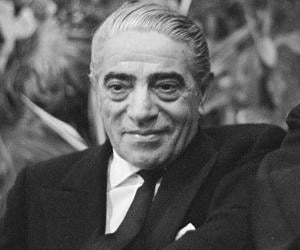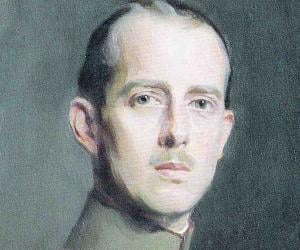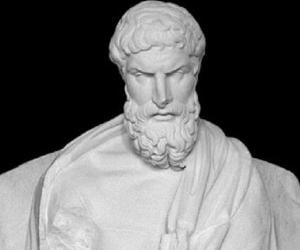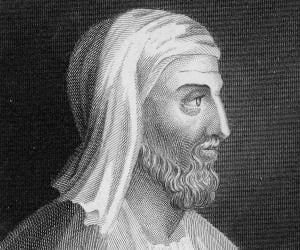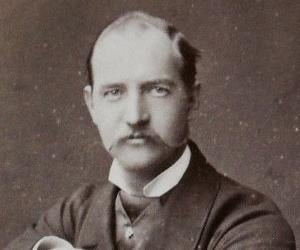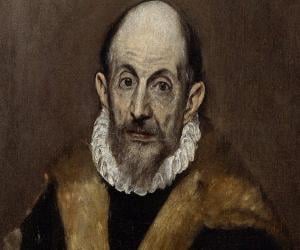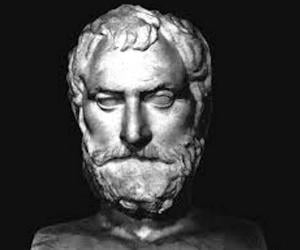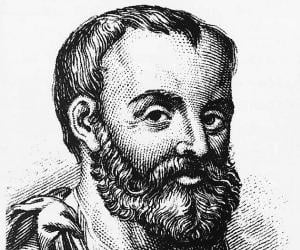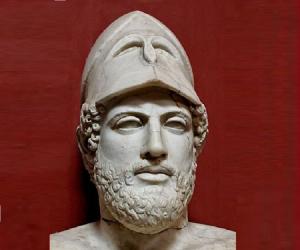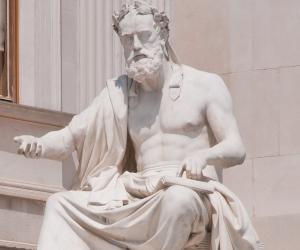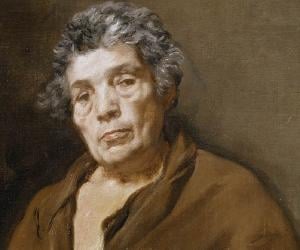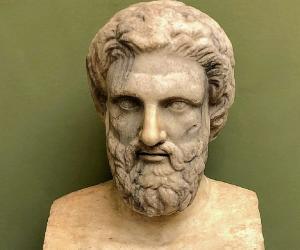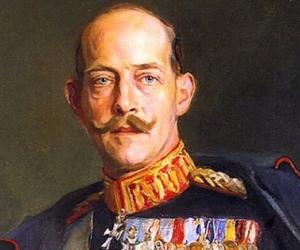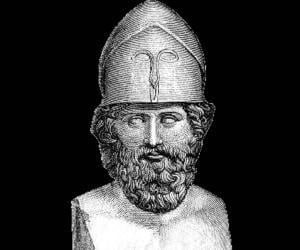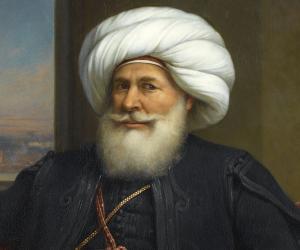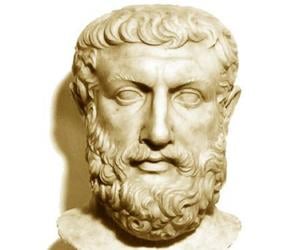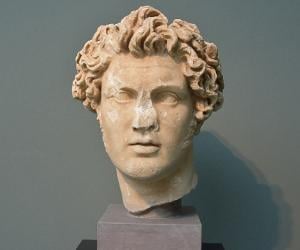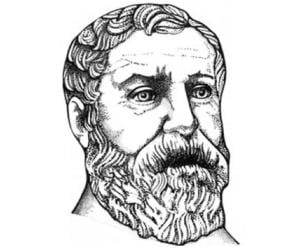Giannis Antetokounmpo is a professional basketball player and plays for the Milwaukee Bucks of the National Basketball Association. He’s called ‘Greek Freak’ as he hails from Greece and also due to his size, speed and ball-handling skills. He was named NBA’s Most Valuable Player twice and NBA’s Defensive Player of the Year in 2020. He represents Greece at the international level.
Famous Greek philosopher and scientist, Aristotle, made significant contributions to various fields of science and arts of his era–logic, biology, politics, economics, ethics and aesthetics. Along with Socrates and Plato, he laid much of the foundation of Western philosophy. Student of Plato and teacher of Alexander the Great, he founded Lyceum, the school of philosophy, and the Aristotelian tradition.
Plato was one of the most important Ancient Greek philosophers, who contributed greatly to the fields of mathematics, metaphysics, politics, art, and poetry. Along with his famous student Aristotle and equally famous teacher Socrates, Plato is considered one of the founders of spirituality and Western religion. Platonism remains one of his important contributions.
A famous Greek philosopher, Socrates is credited with founding Western philosophy along with other popular philosophers of his time. An enigmatic figure, most of his work is documented by his famous student Plato. Socrates is widely regarded as one of the most influential philosophers of all time as he had a strong influence on the philosophers of the modern era.
Pythagoras was an Ionian Greek philosopher. He is credited with many scientific and mathematical discoveries, including the Sphericity of the Earth, the Theory of Proportions, the five regular solids, Pythagorean tuning, and the Pythagorean Theorem. Pythagoras influenced other philosophers like Plato and Aristotle. His philosophy also had a major impact on personalities like Isaac Newton, Johannes Kepler, and Nicolaus Copernicus.
Leonidas I was the king of the Greek city-state of Sparta from 489–480 BCE. He was the son of King Anaxandridas II. He is remembered for his participation in the Second Persian War, especially for his leadership at the Battle of Thermopylae. He died at the battle, gaining legendary status as the leader of the 300 Spartans.
Herodotus was a Greek historian credited with writing a book titled The Histories, a detailed record on the genesis of the Greco-Persian Wars. Dubbed the Father of History, Herodotus is widely believed to have been the first person to write about historical events based on information gathered about the events through a method of systematic investigation.
Diogenes Of Sinope was a pioneer of Cynic philosophy. It is believed he had expressed his wish to be thrown out of the city after his death, so that animals could eat his corpse. He believed humans needed to learn how to live without fuss and with honesty like dogs.
Saint George was a Christian soldier in the Roman army who is accepted as a saint in Christianity. He was sentenced to death for refusing to recant his Christian faith and was executed by decapitation, according to Greek tradition. Saint George's Day is celebrated in his memory on 23 April. He is one of the most venerated saints in Christianity.
Greek polymath Eratosthenes of Cyrene was a mathematician, poet, geographer, music theorist, and astronomer. He also served as the Library of Alexandria’s chief librarian. He was also the first to calculate the Earth’s circumference and the tilt of the Earth's axis. Nicknamed Pentathlos, he also invented many scientific terms.
A Greek shipping magnate who was one of the world's richest men at one point, Aristotle Onassis held the world's largest privately-owned shipping fleet at the peak of his career. He was involved in the privatization of the Greek national airlines as well. He had liaisons with many famous and beautiful women and was married to Jacqueline Kennedy.
Prince Andrew of Greece and Denmark, the son of King George I of Greece, served as a major general in the Greco-Turkish War of 1919–1922. The Turkish forces recaptured Smyrna and Andrew was blamed for the loss of Greek territory. As a result, he was exiled from Greece and he lived in France where he died.
Greek philosopher Epicurus is remembered for establishing a school of philosophy known as Epicureanism. He believed that people could achieve ataraxia and aponia, freedom from fear and pain, unless they indulged in amoral behavior. He established a school named The Garden in Athens, where students could discuss philosophical ideas.
Plutarch was a Greek philosopher, essayist, biographer, and historian. He also served as the priest at the Temple of Apollo. He is best remembered for his work Parallel Lives, a series of 48 biographies of noteworthy men. His writings had a huge influence on French and English literature. Writers like Shakespeare were influenced by his works.
Sophocles was an ancient Greek writer. He is one among three tragedians from his era whose plays have survived. Sophocles was the most decorated and celebrated playwright for almost five decades, during which he won 24 out of 30 dramatic competitions, which took place in the city-state of Athens during the religious festivals of the Dionysia and the Lenaea.

George I of Greece reigned as the king of Greece from 1863 until his murder in 1913. During his reign of nearly 50 years, which is the longest in the history of modern Greece, George helped expand Greece's territory significantly. During his reign, Greece also became increasingly prosperous and attained a popular place on the European stage.
Yanni is a Greek keyboardist, pianist, composer, and music producer. He achieved international recognition by organizing and producing concerts at historic monuments, such as Taj Mahal, Burj Khalifa, and the Great Sphinx of Giza. Adhering to his one world, one people philosophy, Yanni works with musicians of various nationalities to create music that incorporates an eclectic fusion of ethnic sounds.
One of the Seven Wise Men of Greece, Thales was a 6th-century mathematician who believed that the Earth was a flat disk floating on a huge ocean. Legend has it that he had predicted a solar eclipse that stopped a major battle and had also laid down several geometrical theorems.
Galen was a Greek physician, philosopher, and surgeon in the Roman Empire. Regarded as one of the most proficient medical researchers in ancient history, Galen influenced the growth of several scientific disciplines, such as neurology, pharmacology, pathology, physiology, and anatomy. Thanks to the translation of his works into Arabic, Galen's approach to medicine remains influential in the Islamic world.
Pericles was an influential and prominent Greek statesman and orator. He also served as the general of Athens during fifth-century Athens, which came to be known as the Golden Age of Athens. Thanks to his efforts, Athens became known as the cultural and educational center of the ancient Greek world. Pericles is also credited with beautifying and protecting the city.
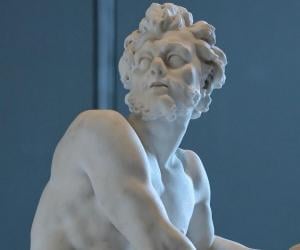

Greek composer Vangelis is one of the finest and most versatile figures in electronic music. He soared to international fame with his Academy Award-winning soundtrack of the film Chariots of Fire. Starting to learn the piano at age 3, he later experimented with jazz and rock-n-roll.

One of the three ancient Greek tragedians, together with Sophocles and Aeschylus, Euripides wrote around 92 plays, out of which 18 or 19 have survived intact. He is known for theatrical innovations that influenced modern drama as well. This particularly includes his representation of mythical heroes as common people in exceptional circumstances. His notable works include Hippolytus, Alcestis and Medea.
Remembered as both an Athenian military leader and an author, Xenophon, a friend of Socrates, remains a major link between historians and the Greek philosopher, with his works such as Symposium and Memorabilia. He also led the Ten Thousand, in a Persian expedition under Cyrus the Younger.

Constantine II of Greece reigned as the King of the Hellenes from 1964 until 1973 when the Greek monarchy was abolished. His reign culminated in the Greek junta and the former King of Greece was forced into exile when the countercoup against the junta failed. Constantine is also a former sailor who won an Olympic gold in the 1960 Olympics.
Democritus was an Ancient Greek philosopher whose philosophies predated Socratic philosophies. He is credited with formulating one of the earliest atomic theories of the universe. Best known for his work on subjects like biology, anthropology, and cosmology, Democritus is considered by many to be the father of modern science. He was also a pioneer of geometry.
There is not a single child in the world who has not heard of Aesop’s Fables, but the legendary Greek fabulist Aesop, known for using animal characters to impart moral lessons, is believed to have never existed, by some historians. Aesop was perhaps a name concocted to unite references for age-old fables.

Greek filmmaker, producer, and screenwriter Yorgos Lanthimos initially studied business and was also part of the Greek national basketball team before stepping into films. A prominent figure of the Greek Weird Wave movement, he is known for his Academy Award-nominated screenwriting in The Lobster and direction in The Favourite.
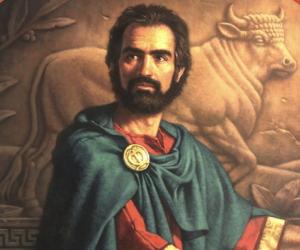
Widely considered as the author of the two books of the New Testament, Saint Luke the Evangelist contributed far more to the New Testament than any other author and had a huge impact in the development of Christianity. He was also the companion of St. Paul the Apostle, a physician as well as the patron saint of artists and physicians.
The 5th-century BC warrior politician Themistocles has gone down in history as one of the first to consolidate the Athenian navy. He is remembered for his victories in wars such as the Battle of Salamis. His exploits have been immortalized in movies such as 300: Rise of an Empire.
Epictetus was a Greek philosopher who viewed philosophy as a way of life rather than a theoretical discipline. He taught philosophy vehemently and founded a school of philosophy in Nicopolis. Arrian, his most famous pupil, is credited with publishing Discourses, a series of informal lectures given by Epictetus. Today, the philosophy of Epictetus is being applied in various fields.
Muhammad Ali of Egypt was the de facto ruler of Egypt from 1805 to 1848. He was also the Albanian Ottoman governor and is considered the founder of modern Egypt. He implemented drastic reforms in the military, economic and cultural spheres in Egypt. He established the Muhammad Ali dynasty that ruled Egypt until the revolution of 1952.

Greek king Pyrrhus, son of prince Aeacides, belonged to the Hellenistic period and ruled Epirus. His destructive losses in the wars that he fought gave rise to the term “Pyrrhic victory.” He fought against Rome in the Pyrrhic War and later died while fighting a street war in Argos.
Greek inventor and mathematician Hero of Alexandria is remembered for his iconic work on geometry, Metrica, which was lost for many years but was then discovered after 1896. His most significant contributions include the Heron’s formula to find the area of a triangle, the Hero engine, and a wind-harnessing machine.

